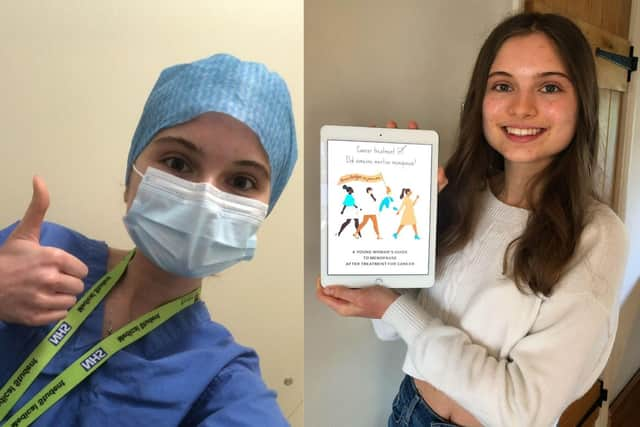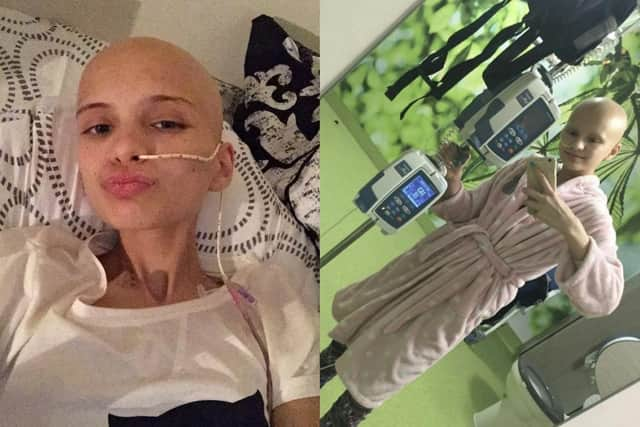The Kettering cancer survivor who is now training to be a doctor so she can help others
and live on Freeview channel 276
A Kettering woman who was diagnosed with cancer at the age of 14 is now training to be a doctor so she can help others.
Inspirational Ellie Waters is in her second year of medical school at Keele University with ambitions of becoming an obstetrician or gynaecologist.
Advertisement
Hide AdAdvertisement
Hide AdShe said her experiences in hospital and the care she received during her treatment have helped to shape her career aspirations.


The 21-year-old said: “I realised that after I finished treatment I was watching a lot of medical documentaries. I was really interested in medicine and wanted to pursue it as a career.
“I’m thankful it’s led me on this path because I love helping people. It’s everything to me.”
Ellie is sharing her experiences of cancer for the first ever Teenage and Young Adult Cancer Awareness Month (April) to help raise awareness of the signs and symptoms of the disease, as well as some of the unique challenges that young patients face.
Advertisement
Hide AdAdvertisement
Hide AdShe was diagnosed with stage four alveolar rhabdomyosarcoma, a cancer of the soft tissue, in September 2015 having first noticed a small lump on her bottom six months before.


As it wasn’t causing her too much discomfort Ellie didn’t initially think there was any more to it but, as time went on, the lump began to grow.
Other symptoms, including tiredness and constipation, soon appeared but Ellie didn’t think they were connected. The keen cross-country runner was also getting leg pain whenever she ran which doctors put down to a muscle tear. However, when she collapsed midway through a charity run, Ellie revealed the full extent of her symptoms.
She said: “As the lump was in such an embarrassing area I just kept it to myself. It wasn’t until a few months later that I told my mum about the lump, which by then had become quite big.
Advertisement
Hide AdAdvertisement
Hide Ad"I was struggling to sit down on it and was generally quite unwell.”
Doctors initially diagnosed the lump as an abscess and prescribed antibiotics. But, with Ellie’s health and the lump continuing to grow worse, she underwent emergency surgery to remove it.
During the operation a large mass was discovered which was found to be a tumour. Further investigations confirmed her cancer and she was transferred to Queen’s Medical Centre in Nottingham to begin 18 months of intensive chemotherapy and radiotherapy.
As a result of the harsh treatments she received Ellie was – and continues to be – affected by several debilitating side effects as well as the mental, social and financial burden of having had cancer as a teen. She suffers from fatigue and bowel issues and, six months into remission, she went through the menopause early.
Advertisement
Hide AdAdvertisement
Hide AdNow she is keen to raise awareness of the challenges that young patients face after treatment to ensure they get the support they need.
She said: “When cancer treatment finishes that’s not it. I don’t think many people are aware of the challenges faced after.
“I didn’t want to complain as I’d survived my cancer. But, equally, I’d been thrown back into ‘normal’ society again and though I looked like everybody else, and my hair had grown back, I felt so different to others. I felt like an alien and was carrying the burden of all these chronic health problems.”
Ellie said that having cancer as a teen was an incredibly isolating experience.
Advertisement
Hide AdAdvertisement
Hide AdShe said: “Having cancer as a teenager was especially tough, because everyone says their teenage years are difficult anyway, but when you throw cancer into the mix it’s very hard.
“At 14 you want your freedom to go to house parties and out with friends but then suddenly these things are taken away.”
She wants people to know that, often, just giving patients and survivors a space to speak about how they’re feeling is the best way to support them.
Ellie said: “You don’t necessarily have to understand as, if you’ve not been through it yourself, it’s very hard to do that. But just be there to listen, don’t invalidate the person’s feelings and allow them that open space to talk about their feelings.”
Advertisement
Hide AdAdvertisement
Hide AdThinking back to her own road to diagnosis, Ellie advised any young people worried about their health to get any symptoms checked out straight away.
She said: “If you notice anything wrong, or you think you have symptoms of cancer, then go straight to a doctor. It’s something that I wished I had done. Even if it’s in an embarrassing area, or you don’t want to worry anybody, get checked out.
“You think you’re invincible when you’re a teenager. I thought this growing lump would go away and it didn’t even cross my mind that it could be cancer. So, if you see any changes, any problems, or you’ve got anything new, then go to your doctor."
Teens and Young Adults with Cancer (TYAC) is the UK’s only professional association for those involved in the treatment, care and support of this age group, and also supports young patients with information and funds age-specific research.
Advertisement
Hide AdAdvertisement
Hide AdAshley Ball-Gamble, TYAC’s chief executive officer, said: “We’re hugely grateful to Ellie for sharing her inspiring story and highlighting why it’s so important to get symptoms checked out as soon as possible.
"The earlier a diagnosis is made, the better chance there is that treatment will be effective.”